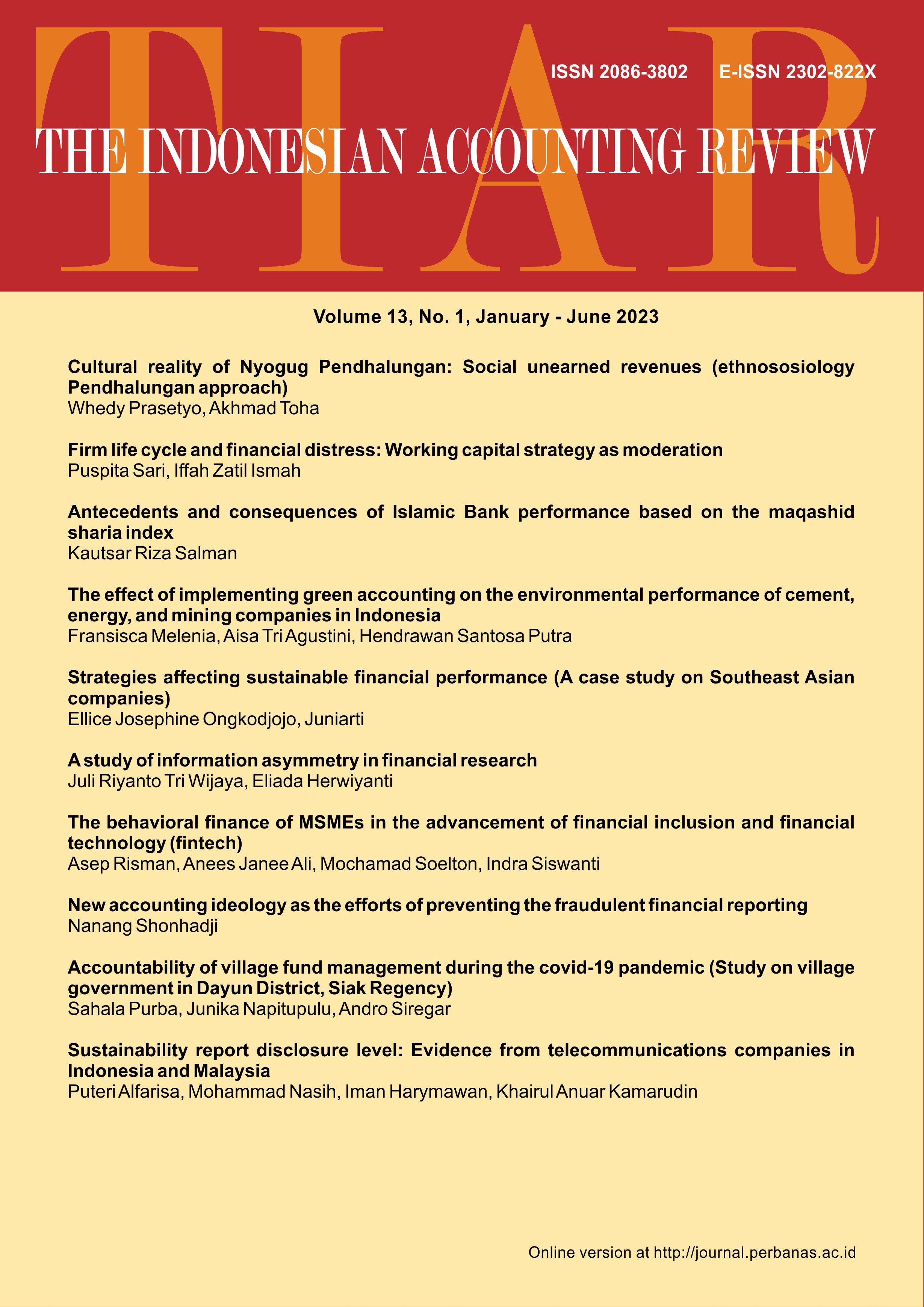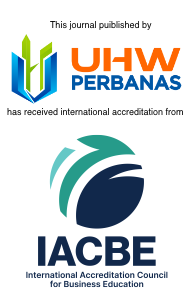Antecedents and consequences of islamic bank performance based on the maqashid sharia index
DOI:
https://doi.org/10.14414/tiar.v13i1.3015Keywords:
Maqashid sharia index, Sharia supervisory board, Islamic social reportingAbstract
This study aims to obtain empirical evidence regarding the antecedents and consequences of performance based on the maqashid sharia index in Islamic banks in Indonesia. The maqashid sharia index in the literature and previous empirical research is limited to its use in the aspect of performance measurement only. This study seeks new insights into the antecedents and consequences of Islamic bank performance based on the Islamic maqashid index. The antecedent studied is the characteristics of the sharia supervisory board, while the consequences studied are Islamic social reporting. This study examines the effect of the sharia supervisory board on the maqashid sharia index in Islamic banks in Indonesia. In addition, this study also examines the effect of the maqashid sharia index on Islamic social reporting. The research sample is 11 Islamic banks in Indonesia within four years (2015-2018). This study found that the characteristics of the sharia supervisory board had a significant effect on the maqashid sharia index. The better the characteristics of the sharia supervisory board the higher the maqashid sharia index is. In addition, the maqashid sharia index has a significant effect on Islamic social reporting, meaning that the higher the maqashid sharia index, the better Islamic social reporting. The first implication is that it requires Islamic banks to pay attention to fair returns, avoid prohibited products and services, and eliminate harmful elements that result in injustice. The second implication is that it requires Islamic banks to seek to increase their profitability, redistribution of profits and welfare, and investment in the real sector.References
Abdul Rahman, H., Abdul Aziz, A., Ibrahim, M. A., Suhaili, N.-A., Daud, A. Z., & Naing, L. (2020). Development and validation of Islamic Governance Examination tool in healthcare settings. International Journal of Health Governance, 25(1), 57–67. https://doi.org/10.1108/IJHG-09-2019-0068
Alam, M. K., & Miah, M. S. (2021). Independence and effectiveness of Shariah supervisory board of Islamic banks: evidence from an emerging economy. Asian Review of Accounting, 29(2), 173–191. https://doi.org/10.1108/ARA-01-2020-0005
As-Salafiyah, A., Rusydiana, A. S., & Mustafa, M. I. (2021). Maqashid sharia-based mosque empowerment index. International Journal of Ethics and Systems, ahead-of-print(ahead-of-print). https://doi.org/10.1108/IJOES-06-2021-0122
Bank Indonesia. (2004). Peraturan Bank Indonesia Nomor : 6/24/Pbi/2004 Tentang Bank Umum Yang Melaksanakan Kegiatan Usaha Berdasarkan Prinsip Syariah. Retrieved from https://www.ojk.go.id/Id/Kanal/Perbankan/Regulasi/Peraturan-Bank-Indonesia/Pages/Peraturan-Bank-Indonesia-Nomor-6-24-Pbi-2004.Aspx.
Bank Indonesia. (2009a). Peraturan Bank Indonesia No. 11/33/PBI/2009 tentang Pelaksanaan Good Corporate Governance bagi Bank Umum Syariah dan Unit Usaha Syariah. Retrieved from https://www.ojk.go.id/Id/Kanal/Perbankan/Regulasi/Peraturan-Bank-Indonesia/Pages/Peraturan-Bank-Indonesia-Nomor-11-33-Pbi-2009.Aspx.
Bank Indonesia. (2009b). Peraturan Bank Indonesia Nomor 11/10/PBI/2009 tentang Unit Usaha Syariah. Retrieved from https://www.ojk.go.id/Id/Kanal/Perbankan/Regulasi/Peraturan-Bank-Indonesia/Pages/Peraturan-Bank-Indonesia-Nomor-11-10-Pbi-2009.Aspx.
Deegan, C. M. (2019). Legitimacy theory. Accounting, Auditing & Accountability Journal, 32(8), 2307–2329. https://doi.org/10.1108/AAAJ-08-2018-3638
Elghuweel, M. I., Ntim, C. G., Opong, K. K., & Avison, L. (2017). Corporate governance, Islamic governance and earnings management in Oman. Journal of Accounting in Emerging Economies, 7(2), 190–224. https://doi.org/10.1108/JAEE-09-2015-0064
Farook, S., Kabir Hassan, M., & Lanis, R. (2011). Determinants of corporate social responsibility disclosure: the case of Islamic banks. Journal of Islamic Accounting and Business Research, 2(2), 114–141. https://doi.org/10.1108/17590811111170539
Fauzia, I. Y., & Riyadi, A. K. (2018). Prinsip dasar ekonimi Islam: perspektif Maqashid al Syariah. PT Prenadamedia Group.
Fitriyah, N., M Tahir, A., & Pusparini, H. (2017). Kinerja Keuangan Dalam Kerangka Maqashid Syariah: Pengaruhnya Terhadap Nilai Perusahaan Dengan Islamic Social Reporting Sebagai Variabel Moderating. Jurnal Riset Akuntansi Aksioma, 15(2), 72. https://doi.org/10.29303/aksioma.v15i2.6
Ghozali, I. (2016). Desain Penelitian Kuantitatif dan Kualitatif untuk Akuntansi, Bisnis dan Ilmu Sosial Lainnya. Semarang: BP Undip.
Ghozali, I., & Latan, H. (2015). Konsep, Teknik, Aplikasi Menggunakan Smart PLS 3.0 Untuk Penelitian Empiris. Semarang: BP Undip.
Hadi, N. (2009). Social Responsibility : Kajian Theoritical Framework , dan Perannya dalam Riset Dibidang Akuntansi. Jurnal Ekonomi Dan Bisnis, 4(8), 88–109.
Hair, J. F., Ringle, C. M., & Sarstedt, M. (2011). PLS-SEM: Indeed a Silver Bullet. Journal of Marketing Theory and Practice, 19(2), 139–152. https://doi.org/10.2753/MTP1069-6679190202
Haniffa, R. (2002). Social Responsibility Disclosure: An Islamic Perspective. Indonesian Management and Accounting Research, 1, 128–146.
Haniffa, R., & Hudaib, M. (2007). Exploring the Ethical Identity of Islamic Banks via Communication in Annual Reports. Journal of Business Ethics, 76(1), 97–116. https://doi.org/10.1007/s10551-006-9272-5
Harningtyas, A. F. (2015). Developing Maqasid al-Shari’ah Index to Evaluate Social Performance of Islamic Banks: A Conceptual and Empirical Attempt. Uluslararası İslam Ekonomisi ve Finansı Araştırmaları Dergisi, 1(1), 5–64.
Hasan, Z., & Asutay, M. (2019). The State of Islamic Governance in Islamic Financial Institutions: Islamic Governance Index. In T. Azid, A. A. Alnodel, & M. A. Qureshi (Eds.), Research in Corporate and Shari’ah Governance in the Muslim World: Theory and Practice (pp. 371–387). Emerald Publishing Limited. https://doi.org/10.1108/978-1-78973-007-420191037
Hudaefi, F. A., & Noordin, K. (2019). Harmonizing and constructing an integrated maqÄá¹£id al-SharÄ«Ê¿ah index for measuring the performance of Islamic banks. ISRA International Journal of Islamic Finance, 11(2), 282–302. https://doi.org/10.1108/IJIF-01-2018-0003
Ishak, M. S. I., & Asni, F. (2020). The role of in applying into modern Islamic banking in Malaysia. Journal of Islamic Accounting and Business Research, 11(9), 2137–2154. https://doi.org/10.1108/JIABR-12-2019-0224
Kholid, M. N., & Bachtiar, A. (2015). Good corporate governance dan kinerja maqasid syariah bank syariah di Indonesia. Jurnal Akuntansi & Auditing Indonesia, 19(2), 126–136. https://doi.org/10.20885/jaai.vol19.iss2.art4
Kuncoro, M. (2014). Metode Riset untuk Bisnis & Ekonomi (Edisi 4). Jakarta: Penerbit Erlangga.
Maali, B., Casson, P., & Napier, C. (2006). Social reporting by Islamic Bank. Abacus, 42, 266–289. https://doi.org/10.1111/j.1467-6281.2006.00200.x
Mohammed, M. O., Razak, D. A., & Taib, F. M. (2008). The Performance Measures of Islamic Banking Based on The Maqashid sharia. International Islamic University Malaysia Journal.
Neifar, S., Salhi, B., & Jarboui, A. (2020). The moderating role of Shariah supervisory board on the relationship between board effectiveness, operational risk transparency and bank performance. International Journal of Ethics and Systems, 36(3), 325–349. https://doi.org/10.1108/IJOES-09-2019-0155
O’Donovan, G. (2000). Legitimacy Theory As An Explanation For Corporate Environtmental Disclosures. In PhD thesis, Victoria University of Technology (Issue February).
Othman, R, Thani, A. M., & Ghani, E. K. (2009). Determinants of Islamic Social Reporting Among Top Shari ’ a-Approved Companies in Bursa Determinants of Islamic Social Reporting Among Top Shariah -Approved Companies in Bursa Malaysia. 12(May), 4–20.
Othman, Rohana, & Thani, A. M. (2010). Four Important Tests Where Ranges for Normal Vary. International Business & Economics Research Journal (IBER), 9(4), 135–144.
Salman, K. R., Muslich, A., & Tjaraka, H. (2018). New Evidence On The Direct And Indirect Influence Of The Maqashid Sharia Index On The Islamic Social Reporting Index. International Journal of Research Science & Management, 5(8), 165–173. https://doi.org/10.5281/zenodo.1405433
Salman, K. R. (2012). Akuntansi Perbankan Syariah Berbasis PSAK Syariah. Jakarta: Penerbit Indeks. Retrieved from http://www.indeks-penerbit.com/index.php?route=product/product&product_id=458
Salman, K. R., & Kurniasari, M. (2020). The Effect of the Sharia Supervisory Board Characteristics on Maqashid Sharia Index. International Journal of Islamic Business and Economics (IJIBEC), 4(1), 51. https://doi.org/10.28918/ijibec.v4i1.2348
Saoqi, A. A. Y. (2017). Analyzing The Performance of Islamic Banking in Indonesia and Malaysia: Maqasid Index Approach. Jurnal Ekonomi Islam, 8(1), 29–50.
Syafii, M., Sanrego, Y. D., & Taufiq, M. (2012). An Analysis of Islamic Banking Performance: Maqashid Index Implementation in Indonesia and Jordania. Journal of Islamic Finance, 1(1), 12–29.
Widiyanti, N. W., & Hasanah, N. T. (2018). Analisis Determinan Pengungkapan Islamic Social Reporting (ISR) (Studi Kasus Pada Perusahaan yang Terdaftar pada Jakarta Islamic Index Tahun 2011 - 2015). BISNIS : Jurnal Bisnis Dan Manajemen Islam, 5(2), 239. https://doi.org/10.21043/bisnis.v5i2.3013
Downloads
Submitted
Published
How to Cite
Issue
Section
License
Copyright (c) 2022 The Indonesian Accounting Review

This work is licensed under a Creative Commons Attribution-NonCommercial 4.0 International License.

















